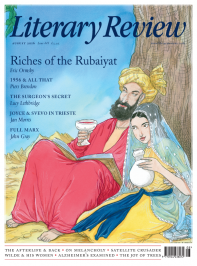Lucian Robinson
Meet Me in Lafayette
Dirt Road
By James Kelman
Canongate 369pp £16.99
In Milan Kundera’s 1967 novel The Joke, a character speculates on the difference between poetry and folk music: ‘a folk song is born differently from a formal poem. Poets create in order to express themselves, to say what it is that makes them unique. In the folk song, one does not stand out from others but joins in with them.’ Kundera and James Kelman are much closer than we might think; they both see themselves as writing within a modernist lineage that starts with Kafka and flows through Beckett. Like Kundera, Kelman has always been interested in music, its compositional purity and, in particular, the collective nature of being in a band – the act of joining in to produce art rather than creating it outside society, as both the novelist and the poet do. In The Joke the finale takes place at a Moravian folk festival; in Dirt Road, Kelman’s ninth novel, the climax comes at the Festival International de Louisiane in Lafayette, where musicians come together to celebrate zydeco and Cajun music, Louisiana’s folk sound, and their francophone heritage.
For Kelman, as for Kundera, music works to free the self from social boundaries. In Dirt Road Murdo, the sixteen-year-old protagonist, plays accordion with a zydeco band and finds a euphoric solace in the music:
It was all there in the song and playing of the song. There was nothing other,

Sign Up to our newsletter
Receive free articles, highlights from the archive, news, details of prizes, and much more.@Lit_Review
Follow Literary Review on Twitter
Twitter Feed
Under its longest-serving editor, Graydon Carter, Vanity Fair was that rare thing – a New York society magazine that published serious journalism.
@PeterPeteryork looks at what Carter got right.
Peter York - Deluxe Editions
Peter York: Deluxe Editions - When the Going Was Good: An Editor’s Adventures During the Last Golden Age of Magazines by Graydon Carter
literaryreview.co.uk
Henry James returned to America in 1904 with three objectives: to see his brother William, to deliver a series of lectures on Balzac, and to gather material for a pair of books about modern America.
Peter Rose follows James out west.
Peter Rose - The Restless Analyst
Peter Rose: The Restless Analyst - Henry James Comes Home: Rediscovering America in the Gilded Age by Peter Brooks...
literaryreview.co.uk
Vladimir Putin served his apprenticeship in the KGB toward the end of the Cold War, a period during which Western societies were infiltrated by so-called 'illegals'.
Piers Brendon examines how the culture of Soviet spycraft shaped his thinking.
Piers Brendon - Tinker, Tailor, Sleeper, Troll
Piers Brendon: Tinker, Tailor, Sleeper, Troll - The Illegals: Russia’s Most Audacious Spies and the Plot to Infiltrate the West by Shaun Walker
literaryreview.co.uk